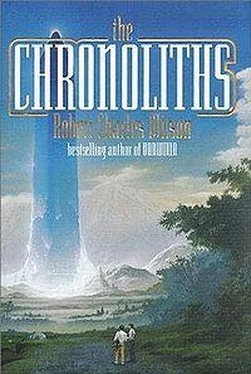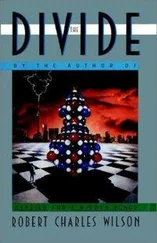Janice settled down in the clinic waiting room, still trying periodically to phone me. But I had left my phone in a backpack on a shelf in the rental. She would have tried Hitch, maybe, but Hitch didn’t believe in unencrypted communication; he carried a GPS locator and a compass and figured that was more than enough for any truly rugged male.
When I first glimpsed the pillar through a scrim of forest I took it to be the chedi of a distant Wat, one of the Buddhist temples scattered throughout Southeast Asia. You can find a photograph of Angkor Wat, for instance, in any encyclopedia. You’d recognize it if you saw it: stone reliquary towers that look weirdly organic, as if some enormous troll had left its bones to fossilize in the jungle.
But this chedi — and I saw more of it as we followed the switchback road up a long ridge — was the wrong shape, the wrong color.
We crested the ridge into a roadblock of Royal Thai Police, border patrol cars, and assorted armed men in rust-pocked SUVs. They were turning away all traffic. Four of the soldiers had trained their weapons on an ancient Hyundai songthaew packed with squawking chickens. The border police looked both very young and very hostile, wearing khakis and aviator glasses and holding their rifles at a nervous angle. I didn’t want to challenge them and I told Hitch so.
I don’t know if he heard me. His attention was on the monument — I’ll use that word for now — in the distance.
We could see it more clearly now. It sat astride a higher terrace of the hill, partially obscured by a ring of mist. Without any visible reference the size of it was difficult to judge, but I guessed it must have been at least three hundred feet tall.
In our ignorance we might have mistaken it for a spaceship or a weapon, but the truth is that I recognized it as a kind of monument as soon as I could see it clearly. Imagine a truncated Washington Monument made of sky-blue glass and gently rounded at all corners. I couldn’t guess who had made it or how it had got here — apparently in a single night — but for all its strangeness it did look distinctly man-made, and men make such things for a single purpose: to announce themselves, to declare their presence and display their power. That it should be here at all was dazzlingly strange, but there was no mistaking the solidity of it — the weight, the size, the stunning incongruity.
Then the mist rose up and obscured our view.
Two uniformed men strode toward us, loose-limbed and surly. “By the look of it,” Hitch said — his muted Southwestern drawl sounding a little too lazy, given the circumstances — “we’ll probably have U.S. and U.N. assholes all over us before long, plus a lot more fucking BPP.” Already, an unmarked but obviously military helicopter was circling the ridge, its downdraft stirring the ground haze.
“So we go back,” I said.
He snapped a single photograph, then tucked the camera away. “We don’t have to. There’s a smuggler’s trail up around that hill. It leaves the road about a half mile back. Not too many people know about it.” He grinned again.
I suppose I smiled back. The second thoughts were coming thick and fast, but I knew Hitch and I knew he wouldn’t be argued out of this. I also knew I didn’t want to be left at this checkpoint without a ride. He wheeled the motorcycle around and we left the Thai cops glaring at our tailpipe.
This was maybe two or three in the afternoon, about the time Kaitlin began to ooze bloody pus from her left ear.
We circled up the smugglers’ trail as far as the Daimler would take us, then concealed the bike in a thicket and hiked a quarter mile more.
The trail was rough, designed for maximum concealment but not maximum comfort. Steep real estate, Hitch called it. Hitch carried hiking boots in the Daimler’s saddlebag but I had to make do with my high-tops, and I worried about snakes and insects.
Had we followed the trail far enough we would no doubt have arrived at some hidden drug cache, an extraction factory, maybe even the Burmese border, but twenty minutes took us as close to the monument as we cared to get — as close as we could get.
We came within a thousand yards of it.
We weren’t the first people to see it at that proximity. It had blocked a road, after all, and it had been there for at least twelve hours, assuming the sound of last night’s “Navy jet” had in fact marked the arrival of the artifact.
But we were among the first.
Hitch stopped at the fallen trees. The forest here — pines, mostly, and some wild bamboo — had collapsed in a radial pattern around the base of the monument, and the wreckage obliterated the path. The pines had obviously been toppled by some kind of pressure wave, but they hadn’t been burned. Quite the opposite. The leaves of the uprooted bamboo were still green and only beginning to wither in the afternoon heat. Everything here — the trees, the trail, the ground itself — was crisply cool. Cold , in fact, if you put your hand down among the windfall. Hitch pointed this out. I was reluctant to take my eyes off the monument itself.
If I had known what was to come, my awe might have been tempered. This was — in light of what followed — a relatively minor miracle. But all I knew was that I had stumbled into an event immensely stranger than anything Frank Edwards had uncovered in the back numbers of the Pittsburgh Press , and what I felt was partly fear, partly a dizzy elation.
The monument. It was not, first of all, a statue ; that is, it was not a representation of a human or animal figure. It was a four-sided pillar, planed to a smooth, conical apex. The material of which it was made suggested glass, but on a ridiculous, impossible scale. It was blue: the deep, inscrutable blue of a mountain lake, somehow peaceful and ominous at once. It was not transparent but carried the suggestion of translucency. From this side — the northern side — it was scabbed with patches of white: ice, I was astonished to realize, slowly sublimating in the humid daylight. The ruined forest at its base was moist with fog, and the place where the monument met the earth was invisible under mounds of melting snow.
It was the ice and the waves of unnaturally cool air wafting out from the ruined forest that made the scene especially eerie. I imagined the obelisk rising like an immense tourmaline crystal from some underground glacier… but such things happen only in dreams. I said so to Hitch.
“Then we must be in Dreamland, Scotty. Or maybe Oz.”
Another helicopter came around the crown of the hill, too low for comfort. We knelt among the fallen pines, the cool air earthy with their scent. When the aircraft crested the hill and was gone, Hitch touched my shoulder. “Seen enough?”
I nodded. It was clearly not wise to stay, although some stubborn part of me wanted to linger until the monument made sense, to retrieve a little sanity from the ice-blue deeps of the thing. “Hitch,” I said.
“What?”
“Down at the bottom of it… does that look like writing to you?”
He gave the obelisk one last hard squint. Snapped a final photograph. “Letters, maybe. Not English. Too far away to make out, and we’re not getting closer.”
We had stayed too long already.
What I learned later — much later — from Janice, was this.
By three p.m., the Bangkok media had obtained video footage of the monument from an American tourist. By four, half the beach-lizard population in Chumphon Province had taken off to see this prodigy for themselves and were turned away en masse at the roadblocks. Embassies were notified; the international press began to sit up and take notice.
Janice stayed with Kaitlin in the clinic. Kaitlin, by this time, was screaming with pain despite the painkillers and antivirals Doctor Dexter had given her. He examined her a second time and told Janice our daughter had acquired a rapidly necrotizing bacterial ear infection, possibly from swimming at the beach. He’d been reporting elevated levels of e. coli and a dozen other microbes for almost a month, but health officials had taken no action, probably because the C-Pro fish farms were worried about their export license and had flexed their muscle with the authorities.
Читать дальше












